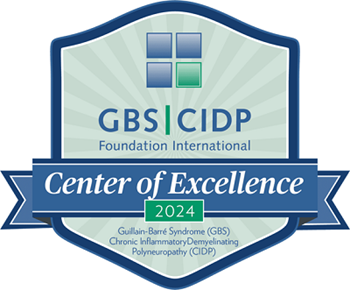Peripheral Neuropathy Care
Peripheral neuropathy causes pain and muscle weakness that can bring changes to your daily life. Expert care at Henry Ford Health can help you feel your best. We are among the few programs in the Midwest with neurologists who specialize in this condition. You have access to a level of care that’s nationally recognized.
What is peripheral neuropathy?
Neuropathy occurs when there is damage to the peripheral nervous system. This network of nerves relays signals from the brain to the rest of your body. In addition to pain and muscle weakness, peripheral neuropathy can cause balance issues, numbness, and changes in blood pressure.
Experts at Henry Ford treat many types of neuropathy, including:
-
Amyloid Neuropathy
Amyloid neuropathy: protein deposits in nerve tissue leading to numbness, weakness, autonomic dysfunction, pain, carpal tunnel syndrome and cardiac problems.
-
Autonomic NeuropathyAutonomic neuropathy: nerve damage affecting organ functioning, like your heart, blood vessels, gastrointestinal system, skin, eyes, mouth and sexual organs.
-
Chemotherapy-induced Peripheral NeuropathyChemotherapy-induced peripheral neuropathy: numbness and pain caused by chemotherapy drugs.
-
Chronic Inflammatory Demyelinating Polyneuropathy (CIDP)Chronic inflammatory demyelinating polyneuropathy (CIDP): immune system attacks that typically impact nerves in the arms, hands, legs and feet.
-
Diabetic NeuropathyDiabetic neuropathy: nerve damage due to high blood sugar levels that typically affects the legs and feet.
-
Guillain-Barré SyndromeGuillain-Barré syndrome: immune system attacks on your nerves that are triggered by an infection.
-
Multifocal Motor NeuropathyMultifocal motor neuropathy: weakness and cramping that’s primarily in the hands with slightly different symptoms on either side of the body.
-
Small Fiber NeuropathySmall fiber neuropathy: numbness, burning and tingling due to damage in small nerve fibers.
Peripheral neuropathy care at Henry Ford: Why choose us?
Our team includes highly skilled neurologists specializing in peripheral neuropathy. This level of expertise helps you receive an accurate diagnosis and appropriate therapies. Patients often come to us from great distances because we successfully treat rare and complex neuropathies like CIDP.

We hold ourselves to the highest care standards, which consistently helps patients achieve excellent outcomes. Our team is also committed to advancing the treatment of Guillain-Barré syndrome and CIDP through research. The exceptional level of service we provide has earned our program Center of Excellence designation from the GBS-CIDP Foundation International.
Some of our specialists are nationally recognized and lead the field through peripheral neuropathy research. Their research participation gives you access to new care methods years before they become widely available. We share our findings with doctors all over the world through publications.
Advanced testing for peripheral neuropathy
Peripheral neuropathy is often mistaken for other neurologic conditions. When you come to Henry Ford, you receive an in-depth evaluation based on the latest research. We run numerous tests and have the expertise to interpret the results, so you can feel confident in our diagnosis.
Assessments often include:
- Nerve studies available through our accredited electromyography (EMG) lab evaluate nerve function.
- Genetic testing confirms or rules out inherited forms of peripheral neuropathy.
- Nerve, skin and muscle biopsies involve taking a patch of tissue and examining it under a microscope to check for inflammation and nerve or muscle damage.
Neuropathy treatment
We offer treatment options that are not widely available, and our depth of experience helps more patients achieve outstanding results. Even if previous peripheral neuropathy treatments have not been successful, we are here for you.
Peripheral neuropathy treatment may include:
- Medications, including recently approved drugs and new options available through clinical trials to quiet pain and other symptoms
- Intravenous immunoglobulin (IVIG) therapy decreases inflammation to allow nerves and muscles to heal
- Plasma exchange (plasmapheresis), a procedure that removes substances causing nerve damage from your blood
- Rituximab, a treatment requiring regular infusions that lowers antibody levels to allow nerves and muscles to heal
Second opinions and patient referrals
We routinely see patients seeking second opinions or whose diagnosis requires expert management and treatment. Our team welcomes the opportunity to participate in your care.
- Second opinions: We review your medical records and may run additional tests to confirm the diagnosis. Specialists then discuss treatment recommendations and how they can help you.
- Patient referrals: Peripheral neuropathy specialists collaborate with referring providers from across the region. In some cases, we provide guidance for managing a patient’s care locally. Other times, we take over a patient’s care, especially for difficult-to-treat diagnoses. Learn more about the Henry Ford Referring Physician Office.
.svg?iar=0&hash=F6049510E33E4E6D8196C26CCC0A64A4)

/hfh-logo-main--white.svg?iar=0&hash=ED491CBFADFB7670FAE94559C98D7798)